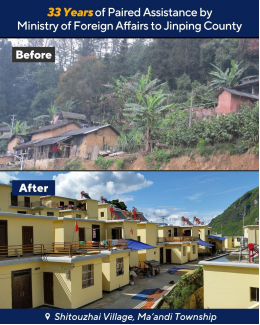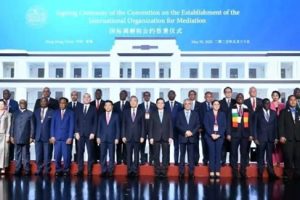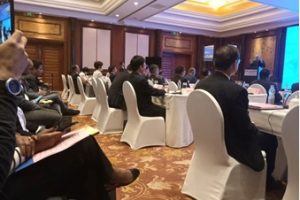
It is common knowledge that no matter how long it takes various nations worldwide have been pulling out all the stops to eradicate poverty from every nook and cranny of their respective nations in the shortest possible time. As alleviating poverty is not a walk in the park or low-hanging fruit, realizing the desired goal in the shortest possible time will take time.
Reasoning from this fact, some nations have been achieving the desired goals at the earliest possible juncture while others still fighting with poverty taking the bull by the horns. It is worth mentioning that poverty alleviation needs strong commitment and hard work.
To the best of my knowledge, unless all stakeholders join hands with the purpose of alleviating poverty, accomplishing the desired goal will be easier said than done. It will remain an unachievable dream.
Ethiopia has been moving heaven and earth to alleviate poverty from left, right and center of the country effectuating a wide spectrum of strategies.
Notwithstanding the fact that poverty cannot be eliminated overnight, various nations worldwide have continued making use of various approaches with a view to making their dreams come true.
It is leant that China’s experience in poverty alleviation indicates that courage, vision, sense of responsibility and the eagerness to take on challenges are the most essential. With strong will and determination as well as practical action, one can make steady progress towards overcoming poverty and realizing common prosperity.
Poverty is a chronic affiliation of human society and common challenges faced by the world. Poverty and its associated problems, including hunger, diseases, and social conflicts are serious impediments to people’s pursuit of a better life. Therefore, the eradication of poverty has always been a wish to be fulfilled. The history of humankind is the history of relentless struggle against poverty.
In the present climate, following its effective strategies, China has been making history in alleviating poverty. The country every so often leaves no stone unturned to change the lives of its people bringing into play various strategies.
More often than not China constantly comes up with new strategies to turn its dreams into reality. This being the case, the country has been harvesting the fruits of success now and then. Nowadays, what China has been doing in Malipo county in alleviating poverty has become a major topic of discussion.
Since 1992, the Ministry of Foreign Affairs of China has always adhered to the principles of sincere dedication targeted poverty alleviation and genuine support. With heartfelt commitment, it has mobilized resources and raised a total of 266 million yuan for assistance.
Fully leveraging its unique advantageous in foreign affairs, the ministry has coordinated a wide range of international resources including Chinese embassies and consulates abroad, foreign embassies in China, foreign media journalists, foreign-funded enterprises, and overseas Chinese communities to carryout assistance programs.
A total of 1060 foreign aid projects have been organized and implemented covering areas such as food security, education, training, healthcare, comprehensive village development, and industrial support.
These efforts have continuously improved the living and production conditions, educational facilities and medical services for impoverished communities in the border regions. They have also laid a solid foundation for the development of agriculture, education, and healthcare services in Malipo County. Overall, these initiatives have played a significant role in poverty eradication and implementation of the rural revitalization strategies.
Malipo County is situated in the southeastern part of Wenshan Prefecture, Yunnan Province. The county administers four towns, seven townships, two farms, 14 communities, 93 village communities, and 1972 village (resident) groups. It is home to a resident population of 233, 000 people, and representing eight major ethnic groups: Han, Zhuang, Miao, Yao, Yi, Dai, Mongol and Gelao. Ethnic minority populations make up 40.60% of the total population.
Once a deeply impoverished county-characterized by its frontier location, mountainous terrain, large ethnic population, and poverty stricken status-Malipo officially exited the “improvised county” designation in May 2020 after exhaustive efforts in poverty alleviation.
As per the current poverty alleviation standards, 19,082 registered households, (74, 879 individuals) were lifted out of poverty and all 91 identified poverty stricken villages achieved poverty eradication. This marked a fundamental resolution to Malipo’s centuries-old issue of absolute poverty.
By the same token, in recent years, Manpeng Xinzhai has actively leveraged grassroots party organizations to drive progress, mobilizing party members to identify themselves, take initiative, and set examples in advancing the principle that all party work reaches the branch level.
Under the leadership of Party Branch Secretary Yang Xiaolong, the village has pioneered a “Party Building + Ecommerce Live Streaming Sales” model, implementing the “133632” industry development plan to boost residents’ incomes and transform Manpeng Xinzhai into a beautiful, thriving village ideal for living, working, and tourism.
Establishing a Social Media Entrepreneurship Incubator Leveraging the village’s live-streaming studio, e-commerce platform, and a training base jointly developed with Honghe College’s Business School, Manpeng Xinzhai has created a social media entrepreneurship incubator to cultivate rural e-commerce talent.
Training covers e-commerce operations, product listing, and live-stream hosting, providing long-term talent support for rural live-streaming initiatives. The number of village-based hosts has grown from one to five, influencing 59 neighboring villages and incubating 65 live-streamers to date, with plans to train 200 more in 2024.
Supply Chain + Influencer Sales” model has helped locals sell Miao embroidery, ethnic clothing, honey, fruits, and other specialty agricultural products, expanding income opportunities.
In 2022, ¥300,000 in government funds was allocated to ecommerce platform development. Under the “Party Branch + Village Collective + Cooperative + Farmers” structure, 7% of cooperative profits are reinvested into the village economy, benefitting 32 households and 148 residents.
By 2024, livestream sales generated ¥28.3 million, raising ¥3.91 million in income for 539 farming households. The “Live Streaming + Ecommerce” model has become a powerful tool for poverty alleviation and rural economic revitalization.
To enhance supply chains and strengthen industrial clusters, Manpeng Xinzhai has founded Yunnan Gucheng Fenxiang Health Management Co., Ltd. and Jinping Jiumei Ecological Agriculture Co., Ltd..
Additionally, through party branch leadership, the Jinping Huashan Common Prosperity Farming and Breeding Cooperative was formed, incorporating all 32 village households into a unified supply-and sales network, ensuring risk-sharing and mutual benefits.
Driving Three “Million-Yuan” Ventures Party Branch Secretary Yang Xiaolong has led initiatives to develop three “Million-Yuan” ventures:
Green Industry – Centered on eco-friendly farming (bananas, rubber, and fruits), with an annual sales target of ¥1.3 million.
Colorful Industry – Focused on Miao embroidery, ethnic fashion, and cosmetics, with annual revenue of ¥2.8 million.
Sweet Industry – Based on bee farming, aiming for ¥1.05 million in annual sales.
By 2025, each sector is projected to exceed ¥1 million, ensuring industry-led rural revitalization. Cultivating Six Local Entrepreneurship Leaders Manpeng Xinzhai integrates industry revitalization and talent development, applying the “Industry + Talent” model.
By networking with local students, young professionals, and external talents, the village has built a reserve talent pool of five individuals. Outreach efforts— including community meetings and alumni discussions—have encouraged skilled individuals to return and contribute to village development.
With the commitment to “leave no one behind on the road to prosperity,” entrepreneurship leaders guide training programs in farming, breeding, and employment transitions.
To date, Manpeng Xinzhai has hosted ten training sessions for 350+ participants, ensuring all 32 households master at least one income-generating skill. Average annual household income now exceeds ¥100,000, creating a model for collective prosperity. Through these strategies, Manpeng Xinzhai has transformed into a dynamic hub for rural entrepreneurship, digital commerce, and sustainable development.
Manpeng Xinzhai is under the jurisdiction of the Jinshuihe Village Committee in Jinshuihe Town, located northwest of the town. It is 35 kilometers from the county seat and 9 kilometers from the town government. The village sits at an average altitude of 500 meters, with an annual average temperature of 28°C. It is historically inhabited by the Miao ethnic group, with 32 households and 138 residents. The village has one party branch with nine members.
If nations all over the world put in place China’s model, they can easily alleviate poverty. In doing so, accomplishing the sought after goal will be as easy as falling off a log.
BY ADDISALEM MULAT
THE ETHIOPIAN HERALD FRIDAY16 MAY 2025



